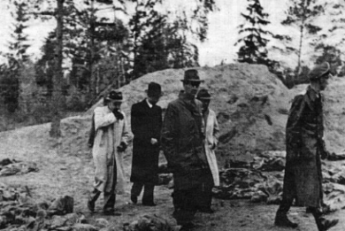
“Casus Paweł Jasienica” and the diagnosis of emigration
Paweł Jasienica, and in fact Leon Lech Beynar, was a Polish historian, writer, author of the history of pre-partition Poland contained in the works “Polska Piastów”, “Polska Jagiellonów”, “Rzeczpospolita of Both Nations”. Mackiewicz does not hide the personal animosities that shared him with Jasienica However, it is not Jasienica that is the main object of his considerations, but the emigration community.
The easiest way to describe Józef Mackiewicz’s attitude towards Paweł Jasienica is through his own article in “Wiadomości” – a London-based Polish emigration weekly. “Casus Paweł Jasienica” – this is the title of the publication.
“In one excellent emigrant weekly, the sentence that Paweł Jasienica, who died recently in Warsaw, had a “flexible pen…” was deleted from my article. For personal reasons, I do not feel offended by this deletion, as it was just a minor passage. For political and ideological reasons, however, it seems to me that it is an exemplary case,” the article begins.
Mackiewicz mentions: “Today, even “flexible pen…” was considered too harsh a term for the memory of the so-called once a “regime writer” who was elevated to the dignity of an “example – to – follow”. “So where are we standing? Or rather: where are we going in exile, then?” Mackiewicz asks.
Mackiewicz recalls the moment that was harmful to him, when Lech Beynar described him in the weekly “Świat” as “the moral corpse of a borderland nobleman”, and called all emigration literature “schematic, with a low servile rank in relation to politics”. Mackiewicz responds: “This personal moment, believe me, I want to skip it.”
The author of the “Road To Nowhere” then recalls that Jasienica wrote in the communist press “with an open visor” and “everyone knows what and how to write in the communist press.” “But so that it cannot be called today, in the free emigration press, even a “flexible pen”? So what do you call it?” Mackiewicz asks rhetorically.
He writes further: “Jasienica takes up a position in the Warsaw radio station Kraj, that is, in the apparatus of communist propaganda aimed specifically at fighting the political Polish emigration. Among others utters well-known slogans about the “anachronism” of Vilnius belonging to the Republic of Poland. He does not condemn it, “I am the furthest thing from making any “moral accusation” against Jasienica – he emphasizes. And he continues: “I understand that others in exile may be (and are in the overwhelming majority) of a different opinion than me. But that the émigré Academic Community of the Stefan Batory University in London, at its 23rd meeting in “Ognisko Polskie” (next to the “tightly filled room”) in 1970, decided just: “…Paweł Jasienica, of saintly memory, for being faithful to the traditions of the Pillarets” …This is really: “We are not keeping up with the camp” …the evolution of emigration” – ironically wrote Mackiewicz.
He also mentions that Jasienica wrote several books on history, including about the Jagiellonians, in accordance with the historical doctrine outlined in the People’s Republic of Poland. “That, for example, the mistake of the Jagiellons was that they pushed east against Moscow instead of turning west against Germany. That, for example, the “reds” in the 1863 uprising were right, not the “whites”, etc. His personal views could coincide with the current historical doctrine. However, we should not deceive ourselves that he could have written the opposite. i.e. could write, but not publish. Books are published in the People’s Republic of Poland by publishing houses of the communist party. There are no others there. Books contrary to the cultural plan are not, and cannot be, published in the communist system,” accuses Jasienica. He suggests that if Jasienica really wanted to escape the rigors of the system, he would have tried to emigrate, then he could have actually written the truth, but this did not happen.
Mackiewicz then considers the actual state of emigration, quoting, among others, Wacław A. Zbyszewski: “We have too many moral judgments, not enough evaluations of political facts.” He wonders what is the state of emigration and what path should she choose? Mackiewicz does not believe in “evolutions of communism” or “socialism with a human face”, which is what many emigrants believe in. He notes that there is an evolution among emigrants, there is no such anti-communist attitude anymore.
He ends the article with a quote: “Let’s not get crazy! – writes Aleksander Peczenik in the “Free Tribune” of the Parisian “Kultura” from July-August 1970. – Let’s not get crazy about the myth of healing what cannot be healed. When we say that socialism can have a human face – we are underpinning communist indoctrination… We should wait for the end of socialism, not for its humanization… Gentlemen, let’s not go crazy! …What path FROM socialism will Poland have to take? I don’t know. When? I don’t know. But at least I know that I don’t know. Awareness of ignorance leads to constructive thinking. It’s better than utopian socialism with a human face. Because whoever does not know, and thinks he knows, who wants to treat communism with communism, pulls himself out of the swamp like Baron Münchhausen by his own braid.
As Mackiewicz emphasized, the aim of the article is not to accuse Paweł Jasienica, but to show, using his example, the state of emigration, which evolved from an extreme anti-communist approach to building “socialism with a human face”, which Józef Mackiewicz was extremely opposed to. He believed that there is no such thing as “good” socialism or communism, because any variety of this ideology is destructive.
Sources:
“The News”, January 17, 1971, London, Year 26, No. 3 (1294)






